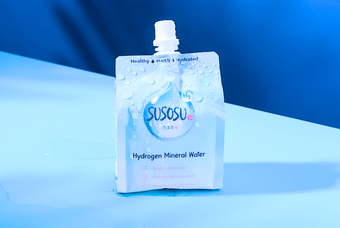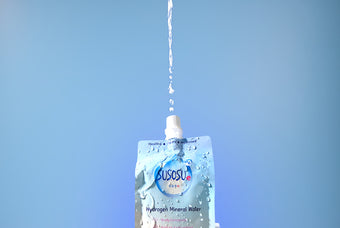After seeing the term “BPA free” become commonplace in the world of bottled water, it’s easy to see why you might be curious.
Like most people, you’ve likely drunk from a plastic water bottle before. And while you lived to tell the tale, you probably didn’t know it could be bad for your health.
So what’s happening in the world of bottled water? And should you be concerned about the growing trend of BPA-free bottles and containers? In this article, we’ll explain BPA-free, show you what’s wrong with BPA, and show the benefits of BPA-free bottled water, as well as highlight how our hydrogen water pouches are one of the best choices for single-serving water consumption.
What Is BPA Free?
BPA, or bisphenol A, is an industrial chemical that’s been a part of the plastic- and resin-making process for over 50 years. This is why polycarbonate plastics and epoxy resins usually contain BPA.
Containers used to store food and beverages, including but not limited to water bottles, are usually made using polycarbonate plastics. However, other consumer goods contain this type of plastic, as well.
Epoxy resins are also used in a lot of containers on the market today. From coating the inside of metal products, water supply lines, and bottle tops, it’s not difficult to find epoxy resins.
Is BPA Bad For You?
Looking at the research, BPA could get into food and beverages if it’s used in the containers used as storage. The problem here is that exposure to BPA could result in adverse health impacts, such as brain and prostate gland problems for fetuses, children, and infants. There’s also evidence that exposure could impact the behavior exhibited by children. Some research even highlights the connection between elevated blood pressure and BPA.
Even with all of this research readily available, the Food and Drug Administration claims BPA is safe at the low concentrations found in some foods. They base this assessment on hundreds of studies. However, the FDA is still reviewing BPA, as well as supporting ongoing research. At this point, it’s important to take several steps to limit your exposure to this potentially harmful chemical.
The following are some recommendations for living a life that limits BPA exposure:
- Commit to using BPA-free products like Susosu Water hydrogen water pouches. We’ve designed our packaging to ensure it’s free of BPA. Other food and beverage manufacturers are producing their products with BPA-free materials, as well. Keep a lookout for products labeled as BPA-free.
- Use fewer cans. Canned foods are typically lined with a resin that contains BPA. With this being the case, it’s ideal to reduce your consumption of canned foods whenever possible.
- Keep food and beverage packaging away from heat. Microwaving polycarbonate plastics or cleaning them in the dishwasher can be problematic. This is due to the fact that the plastic can break down as time progresses, resulting in BPA seeping into your foods.
Why Choose BPA Free Bottled Water
Even though the FDA hasn’t ruled BPA concentrations dangerous just yet, there have been some studies showing just how problematic this chemical is to human health. By 2005, 115 peer-reviewed studies were completed to date. Ninety-four of the studies confirmed BPA’s toxicity.
During 2014, the FDA looked over 161 new studies regarding how BPA impacts health. They were looking to see whether there was a definitive answer regarding how safe BPA’s are or aren’t in an effort to enable regulators to come in and handle the problem. Unfortunately, the scientists saw that the majority of these studies could not be used to set policy, only siting four studies showing enough data to showcase a safe BPA dosing.
As if that’s not enough of a reason to choose BPA-free bottled water, significant companies, including Wal-Mart and Toys R Us began shifting away from polycarbonate baby bottles and feeding products. They claimed they’d no longer carry these products by 2009.
At this point, we’re seeing scientists and regulators looking to discuss how to protect the public from these chemicals. A highly ambitious effort of $30 million led by the National Institute of Environmental Health Sciences (NIEHS) in Durham, North Carolina is bringing government scientists and academic scientists to come together in the hopes that they can reveal more regarding the health risks of BPA.
Even with this being the case, there’s still a long way to go until regulations are put in place. Thus, it’s essential to choose BPA-free bottled water while avoiding BPA exposure as much as possible while these forces push to implement regulations.
Conclusion
Even with the BPA free plastic water bottle craze taking the world by storm, these bottles aren’t the best option. These plastic water bottles can still contain harmful chemicals. So it’s important to remember that just because they’re BPA-free doesn’t mean they’re safe.
At Susosu Water, we’re committed to your health. Our hydrogen-infused water is helping our customers bring additional molecular hydrogen into their diet, allowing them to experience the benefits of the world’s smallest molecule without being forced to expose themselves to harmful BPA.
We use a special pouch designed to keep hydrogen in while keeping harmful molecules out. Our pouches are BPA-free as well, ensuring you never have to worry about what you’re drinking when you drink Susosu Water.
All in all, when it comes to keeping your body healthy, we never cut corners. Rather than using plastics that could harm our customers, we offer a convenient aluminum BPA-free pouch that’s sleek, stylish, and recyclable. Add Susosu Water to your daily hydration regiment today and feel the difference the right hydration can make in your life.










